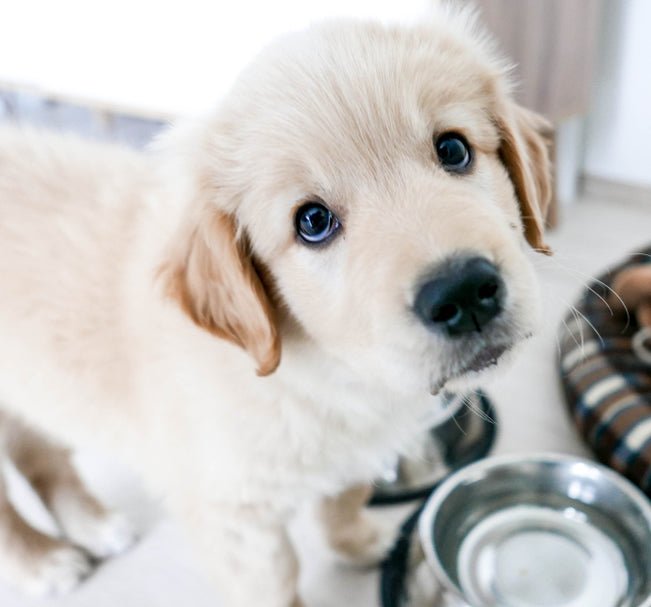![]() Listen to the Podcast
Listen to the Podcast
Congratulations on your new addition! A puppy in the house! What could be better?!? But what now? Where do you start? It can be overwhelming and confusing knowing how to proceed once they're home. Here is a list of the important first steps to take when you bring home your new puppy.
Vet Check
Regardless of where my puppy has come from, my first step when I bring them home is always a vet check. With most good dog breeders, this will be a requirement and your contract may state that you need to bring your pup into the vet within a short period, like 48 hours, after bringing them home. This is always a good safetly measure to ensure there is nothing concerning. They'll check for general signs of good health, listen to their heart and breathing, take their temperature, feel for anything unsual in the stomach and abdominal areas, etc. Be sure to bring a stool sample with you. Puppies are very susceptible to worms and similar parasites that exist in everyday areas, like soil. It is routine practice to de-worm puppies and follow-up is a good tactic until they are old enough for their immune systems to deal with the enslaught of parasites they'll have to get used to.
Crate Train
Every dog should be trained to be calm when contained. Most dogs will graduate from needing to be crated in the home, but they still may need to be crated in the car, at the vets or if boarded. Crates are amazing tools. There are so many reasons to crate train your puppy. The most important being their safety when you can't watch them.
More and more, good dog breeders are working hard to get puppies accustomed to being alone in a crate before they are sent home. This is a wonderful way of easing the transition. When you are searching for your puppy, ask the breeder what their protocols are and if they start crate training before the pups leave for their new homes. This puppy will have a portable den to find comfort in when he's trying to get used to his new life.
House Train
Of course, this is high on the priority list. Nobody wants a mess in the house! Another bonus of crate training is that it is very beneficial in house training success. To a dog, a crate is like a den and most puppies will innately want to keep their dens clean. That means the crate will help them identify the need to go and will help them learn to hold their bladder and bowels. It will also prevent them from having accidents in the house when you can't supervise them.
House training is all about supervision and feedback. We've written extensively about it on the blog previously. Here's a great article on House Training to get you started!
Puppy Class
Don't walk, RUN! Get to a good puppy class! Especially if you are a first time puppy owner. A good puppy class can set you up for a wonderful, life-long journey with your pup. All too often, people wait until they start to have trouble with their dog to seek training advice. That is the equivalent of waiting until your teen is ready to drive to teach them to read so they can interpret road signs. Do not wait. Start your training right away so that rather than trying to correct problems, you're teaching your puppy to have good manners and skills from the onset. It will save you a lot of grief to be proactive about your dog's training.
Socialize
This is another benefit of a good puppy class. There will be an opportunity for your pup to have experiences in the vacinity of other dogs and puppies. They will also likely have a short play session during the class. This exposure is very important and is the best way to ensure safe interaction.
Socialization is an important part of raising a puppy, but it is often misinterpreted as needing to interact with something. Socialization is simply exposure. As long as your dog has been exposed to external stimuli while having pleasant experiences, they will benefit from it. They do not need to play with every dog they meet in order to be well-socialized. That tactic can actually set you back as not all dogs are willing to tolerate puppies. It's a high risk if you don't know the other dog and can't claim that they'll be safe interacting with your puppy.
While we want them to see and be exposed to all types and varieties of people, we do not need them to interract with everyone they meet. Again, this can be a detriment as most people will unintentionally reinforce bad behaviours like jumping up or even nipping when greeting a puppy. Simply being exposed to new people and having positive experiences surround those experiences is great socialization. So bring some treats, go to a spot that has people and work your pup's favourite games, tricks and obedience skills. That will go a long way towards having a well-socialized pup.
There are many more things you'll need to do with your pup, but these important things will get you started on the right track!
As always, Happy Training!

